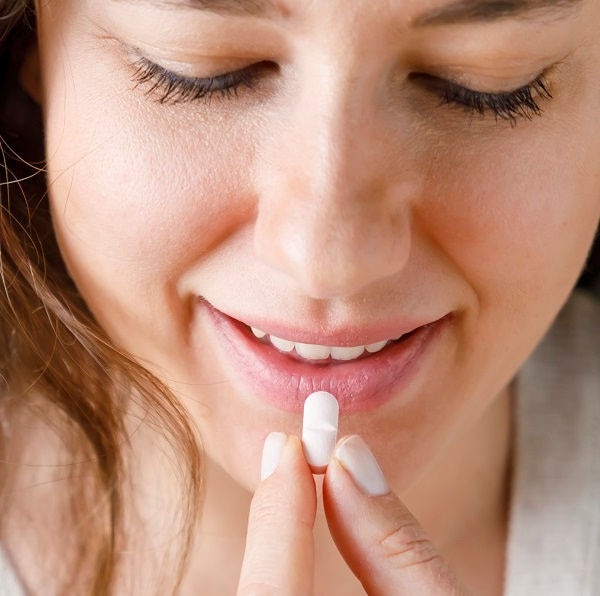News
February 1, 2024
World Cancer Day: Decoding the science behind cannabidiol in cancer care
Explore the science supporting cannabidiol (CBD) as an emerging cancer treatment.

Summary
- Remarkable strides have been made in cancer prevention, diagnosis and treatment for some – but not all patients.
- This World Cancer Day, we’re reflecting on the promising potential of cannabinoid-based drug discovery and development in the field of cancer care and how it’s helping to address unmet patient needs.
- Read on to discover the latest scientific insights behind cannabidiol (CBD) for cancer treatment and uncover how dsm-firmenich is empowering drug developers to tap into this innovative space.
The therapeutic possibilities of CBD
Cannabidiol (CBD) has been gaining significant interest from the scientific community for some time now, enabled by evolving regulatory frameworks, growing acceptance of the molecule and its promising application in up to 25 indications.1 Presently, there are 200-plus active clinical trials investigating the potential of CBD-based medications in various therapeutic areas, including pain management, spasms, neurological disorders, sleep, mood disorders – and cancer.2 On this World Cancer Day, we’re diving into the latest scientific evidence showcasing the possible benefits of CBD in patients diagnosed with the disease, including its potential as a cancer treatment and in symptom management.
CBD and cancer under the microscope
Cancer is an extremely complex disease that remains difficult to treat despite progression in medicine. In recognizing this, there is an opportunity to broaden treatment possibilities for patients with cancer – paving the way for a world where every patient has access to the care they rightfully deserve. CBD is demonstrating capabilities in this arena. Researchers are actively exploring the anti-cancer attributes of CBD, with fresh insights revealing promise, particularly in the context of breast and lung cancers.
1. CBD for breast cancer
Breast cancer, the most prevalent malignancy globally, is anticipated to surge by 40% in new cases and 50% in deaths by 2040.3 One analysis examined CBD’s role in several breast cancer lines, with and without tamoxifen (a hormone drug commonly prescribed in patients with breast cancer to reduce the risk of reoccurrence).4 It revealed that CBD alone induced cell death across all lines. But when used in conjunction with tamoxifen, synergistic effects were observed, leading to enhanced anti-cancer function. This supports the use of CBD as a combination therapy for patients with breast cancer.
2. CBD for lung cancer
Lung cancer is the most chronic form of the disease and leading cause of cancer mortality in the world.5 In a recent study in mice with lung cancer, some were treated with a CBD spray using a medical inhaler.6 The results revealed that the average tumor size was smaller in the treated mice (6 mm versus 16.1 mm). In addition, tumor growth rate was slower because CBD administration suppressed angiogenesis (tumor blood vessel development) and CD44 expression (a marker of cancer stem cells). Although it wasn’t a clinical study, the researchers did use human tumors grafted into the mice, suggesting an application for patients with cancer. But this is not the only evidence.
These new findings add to the growing bank of research underscoring CBD’s anti-cancer properties. Multiple in vitro investigations have revealed the ingredient’s ability to trigger cell death in both lung cancer cell lines and patient-derived tumor cells.7 What adds to the intrigue is further proof suggesting that CBD also targets cancer stem cells – a subset of tumor cells responsible for tumor initiation and potential relapses. By inducing apoptosis in cancer stem cells, CBD is thought to help reduce the self-renewal of these cells.8 This is significant since stem cells are notoriously treatment resistant.
Championing better cancer care
Even with advancements in medical care, patients undergoing cancer treatments often still encounter challenging symptoms, such as nausea, vomiting, appetite loss and pain. This is another area where cannabinoid-based therapies could play a role. Early-stage in vitro research shows that some pharmaceuticals derived from cannabinoids exhibit anti-sickness properties and therefore could be used to alleviate the distressing symptoms associated with cancer and its treatment.9 Further scientific research is needed to validate the potential of cannabinoids in addressing cancer-related symptoms, but it is a growing area of interest.
Enter the world of cannabinoid innovation with confidence
There is a unique opportunity to enhance cancer care by broadening treatment possibilities while improving compliance. The role of cannabinoids – like CBD – in cancer is still an emerging area of research. But results are encouraging and it's being revealed as a potentially innovative way to address the disease. What’s exciting is that using CBD as a therapy for difficult-to-treat diseases is expanding outside cancer too, and into the realms of insomnia, mental health disorders, such as anxiety, and beyond. With this in mind, the polyvalence of CBD in the pharmaceutical landscape seems prominent and the market for novel cannabinoid-based drugs is full of possibilities.
As a purpose-led company in the pharmaceutical industry, we want to ensure every patient receives the support they need. However, we understand that cannabinoid formulation can be complex to navigate. In our latest whitepaper, we reveal the due diligence considerations across the entire cannabinoid-based drug development journey – from choosing the right cannabinoid active pharmaceutical ingredient (API) and increasing the odds of commercial success, all the way to fine-tuning patient experience, convenience and compliance.
References
1. IQVIA. CBD market landscape, Q3 2023.
2. Clinicaltrials.gov as of April 2021.
3. WHO. International agency for research on cancer. Current and future burden of breast cancer: global statistics for 2020 and 2040.
4. Dobovisek et al., Effect of combining CBD with standard breast cancer therapeutics. Advances in Cancer Biology – Metastasis. 2022, 4: 100038.
5. WHO. Lung cancer, [Factsheet], 2023.
6. Salles et al. Inhalant cannabidiol impedes tumor growth through decreased tumor stemness and impaired angiogenic switch in NCI-H1437-induced human lung cancer model. Hum Cell, 2023;36(3):1204-1210.
7. Green et al. Role of Cannabidiol for Improvement of the Quality of Life in Cancer Patients: Potential and Challenges. Int J Mol Sci., 2022;26;23(21):12956.
8. Hamad H & Olsen BB. Cannabidiol induces cell death in human lung cancer cells and cancer stem cells. Pharmaceuticals (Basel), 2021;14(11):1169.
9. Kleckner et al. Opportunities for cannabis in supportive care in cancer. Ther Adv Med Oncol. 2019; 1(11):1758835919866362.
Learn more
Download the publication now to discover the roadmap to success in cannabinoid-based drug development.
Related Content
Quick links
Customized blends of functional ingredients in one single, efficient premix.
Streamline your product development process and get to market faster.
From trade shows to conferences and other industry events, find out where you can meet us next.
Talking Nutrition, Health & Care
Explore new science, consumer insights, industry news and more in our latest articles.
Discover educational whitepapers, webinars, publications and technical information.
Request samples, place orders and view product documentation.


